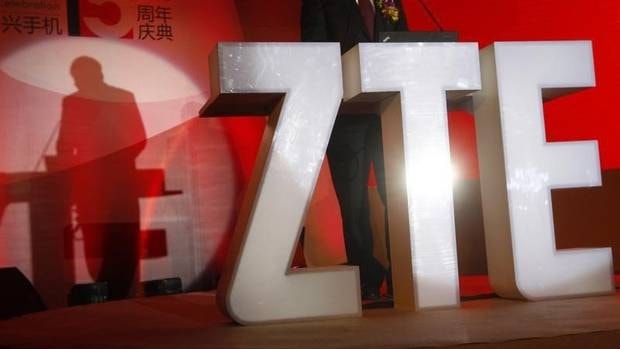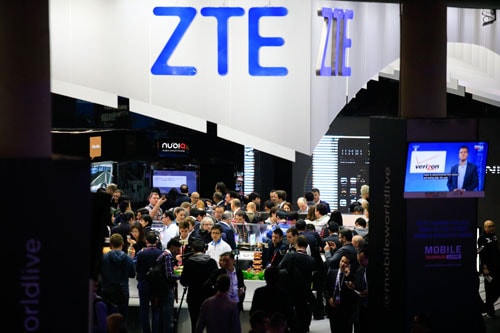America "strikes" China again
(Baonghean) - The story of commercial espionage has been considered a prominent issue in the US-China relationship for many years. However, these conflicts were once again pushed to a new level when on March 8, the US imposed sanctions on the Chinese telecommunications equipment group ZTE for violating the embargo on Iran. This incident was considered by public opinion as a "cold shower" on ZTE as well as the suspicious relationship that has always existed between the US and China.
 |
| Logo of ZTE Corporation. Photo: BBC. |
With questions about the transactions of Chinese telecommunications equipment company ZTE, the US Department of Commerce has conducted an investigation and clarified whether ZTE purchased US products through front companies and then shipped them to Iran.
The investigation found that ZTE had signed contracts to export millions of dollars worth of hardware and software to Iran's largest telecommunications services company, TCI, as well as a subsidiary of the company, meaning ZTE sold everything from manufacturers like Microsoft, Dell, Oracle and IBM to Iran's telecoms.
Based on these results, the US Government has decided to sanction ZTE Corporation for the “obvious” reason that the company is evading sanctions against Iran. Accordingly, ZTE will no longer be supplied with components by US manufacturers.
In addition, the restrictions require all foreign suppliers of ZTE Corporation to obtain a license from the US Department of Commerce before exporting any equipment or components manufactured in the US to the corporation. The decision also means that ZTE Corporation will have more difficulty buying American products, as the US Department of Commerce is very likely to reject license applications.
As soon as the ban was announced, trading of ZTE shares on the Hong Kong and Shenzhen stock exchanges was suspended. Reuters news agency quoted ZTE's announcement on the Hong Kong and Shenzhen stock exchanges, also saying that ZTE shares fell nearly 20% on both exchanges since the beginning of the year, before trading was suspended.
Many analysts also commented on the impact of the ban, saying that this restriction will not affect ZTE's smartphone sales in the US, or immediately impact the company's overall production activities because ZTE has completed purchasing the components it needs for 2016, but it does not rule out the possibility that ZTE may be disrupted in its supply chain if the sanctions are applied long enough.
 |
| China's Foreign Ministry reacts angrily to the US decision Photo: Bloomberg. |
Thus, the US sanctions have had initial effects on China's leading telecommunications group ZTE. Therefore, public opinion is not surprised by China's reactions.
The Chinese Foreign Ministry expressed its opposition and anger at the US decision. The Chinese Foreign Ministry spokesman even called these actions harmful to bilateral relations, saying that China opposes the US invoking domestic laws to impose sanctions on Chinese enterprises. Beijing hopes that the US will stop this wrongful action and avoid harming bilateral relations and China-US trade cooperation.
The accusations of “commercial espionage” between the US and China can be called a “daily bread” issue and always increase the existing tensions between the two countries, but public opinion is asking why China still ignores international regulations to “collude” with Iranian companies.
Many analysts believe that China has long wanted to gain an important position in this Middle Eastern country. Establishing a close business relationship when international sanctions are lifted is considered China's top goal.
Cooperation with Iran is also considered by observers to be as important as cooperation with Saudi Arabia and more importantly, Iran can be seen as a bargaining chip in the Sino-US relationship. Therefore, Iran has a special strategic and geopolitical role for China. For all these reasons, public opinion believes that China's support for Iran through its companies is completely understandable.
In fact, not just now, but for a long time, not just ZTE, but the Chinese telecommunications group Huawei has always been in the sights of the US government and more than once these two groups have been accused of not operating independently from the Beijing government.
The case first came to light in March 2012, when ZTE purchased surveillance equipment that could be used by TCI to spy on Iranian citizens. The contract the two companies signed in December 2010 was worth $130.6 million.
As a result, TCI may have received equipment from HP, Dell, Cisco and several other companies. The FBI investigation found that ZTE tried to conceal contracts with TCI by disassembling documents to deceive US investigators, although the actions are still unclear.
Although both the US and China always have reasons for their accusations, it is not difficult to see the real benefits behind these actions. And the mutual sanctions and suspicions will continue to be barriers that will never be resolved in the US-China relationship.
Thanh Hien
| RELATED NEWS |
|---|


